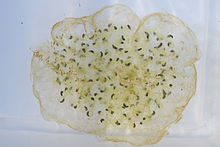
Summary
Chlorococcaceae is a family of green algae, in the order Chlamydomonadales.[1] They are mostly soil-dwelling algae.[2] Many members of this group produce lipids and secondary carotenoids.[2]
| Chlorococcaceae | |
|---|---|

| |
| Ambystoma maculatum egg mass at the University of Mississippi Field Station. Symbiotic Oophila amblystomatis algae (green) is visible surrounding each developing larva. | |
| Scientific classification | |
| (unranked): | Viridiplantae |
| Division: | Chlorophyta |
| Class: | Chlorophyceae |
| Order: | Chlamydomonadales |
| Family: | Chlorococcaceae Blackman & Tansley, 1902 |
| Genera[1] | |
|
See text. | |
The Chlorococcaceae consists mostly of coccoid (single, nonmotile) cells with one parietal or central chloroplast and one or multiple nuclei. The chloroplast contains a single pyrenoid surrounded by a starch envelope. The cell envelope may thicken with age and develop into a mucilaginous stalk in some species.[2] Reproduction consists of zoospores with a cell wall; after they stop swimming, the zoospores retain their shape.[2]
The family Chlorococcaceae is currently under taxonomic revision. Currently, the type genus Chlorococcum is polyphyletic and the status of its type species, Chlorococcum infusionum, is unclear.[2]
List of genera edit
- Apodochloris
- Athroocystis
- Axilococcus
- Borodinellopsis
- Chlorococcum
- Chlorohippotes
- Closteridium
- Cystococcus
- Cystomonas
- Emergococcus
- Emergosphaera
- Eubrownia
- Fasciculochloris
- Ferricystis
- Kentrosphaeropsis
- Lautosphaeria
- Nautococcus
- Neglectellopsis
- Neospongiococcum
- Octogoniella
- Phaseolaria
- Pseudodictyococcus
- Pseudoplanophila
- Pseudospongiococcum
- Pseudotrochiscia
- Radiosphaera
- Skujaster
- Spongiochloris
- Spongiococcum
- †Syndesmorion
- Tetracystis
- Torgia
- Ulotrichella
- Valeriella
- Valkanoviella
References edit
- ^ a b Guiry, M.D.; Guiry, G.M. (2023). "Family: Chlorococcaceae taxonomy browser". AlgaeBase version 4.2 World-wide electronic publication, National University of Ireland, Galway. Retrieved 2023-05-22.
- ^ a b c d e Temraleeva, A. D.; Moskalenko, S. V.; Bachura, Yu. M. (2017). "Morphology, ecology, and 18S rDNA phylogeny of the green microalgal order Protosiphonales (Chlorophyceae, Chlorophyta)". Microbiology. 86 (2): 159–169. doi:10.1134/S0026261717020205. S2CID 254840566.
External links edit
Data related to Chlorococcaceae at Wikispecies


